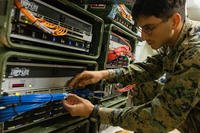CAMP BUEHRING, Kuwait – A Texas Army National Guard soldier was one of a select few individuals here to qualify for the coveted Expert Field Medical Badge (EFMB) on Wednesday.
Spc. Wesley Acuna of Round Rock, Texas, joined an elite group as he completed the final qualifying event, a grueling 12-mile forced march around this remote base in the Kuwaiti desert, just south of the Iraq border. He is currently deployed to the Middle East with the 36th Combat Aviation Brigade (CAB) in support of Operation Enduring Freedom.
When the process started six days ago there were 138 Soldiers with high hopes of earning the distinction of being among the best in the U.S. Army medical field. After several qualifying events that tested them mentally and physically for six days, only a small percentage were left at 4 a.m. to start the road march, which required the soldiers to wear a full combat load and finish in under three hours.
When it was all over, only 21 soldiers were pinned with the coveted Expert Field Medical Badge on their uniforms by Brig. Gen. Kenneth C. Roberts, Assist. Chief of Staff for Army Central Command.
Col. Rick Adams, commander of the 36th CAB, said that with absolute objectivity, the 16 percent graduation rate for the EFMB competition speaks to the excellence, professionalism and determination that defines Spec. Acuna.
During the last few miles of the road march, as pain took a toll on his body and sweat dripped from his face, Acuna was asked how and why he got involved in the EFMB process.
“I didn’t really plan to do this,” Acuna said. “I started training, and then at some point I just committed.”
The physical challenges and lack of sleep was only a portion of the qualification process as it added a difficult layer of complexity of the tasks. Under harsh and stressful conditions, candidates were tested to prove themselves as expert medical professionals.
Required medical tasks to be performed under life-like simulated combat situations included controlling severe bleeding using a tourniquet, hemostatic device, and dressings, inserting a nasopharyngeal airway, performing needle chest decompression, initiating treatment for hypovolemic shock and the prevention of hypothermia among many others.
Casualty Evacuation and other tasks further tested their abilities in a battlefield environment. Those tasks included evacuating a casualty using a litter, using a one or two-person carry or drag, extricating a casualty from a vehicle, and establishing a helicopter landing point.
“My inspiration to complete this came from my section and my unit’s support,” Acuna said. “I feel really accomplished and confident that I’m a better medic and a better Soldier because of this training and competition.”
“He's among the best and brightest the 36th CAB offers into the fight,” Adams said. “It's Soldiers like Spec. Acuna that make the U.S. Military the most lethal and benevolent force on the planet."
Spc. Acuna is the son of Pete and Lisa Acuna of Round Rock.






























